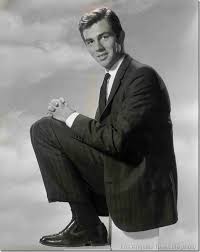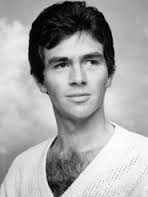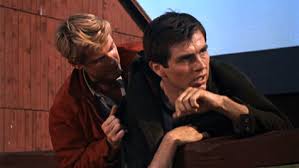If you know one thing about Hampton Fancher, it’s very likely either his early success on “Bonanza” or that he’s credited with co-writing Blade Runner, Ridley Scott’s classic adaptation of Philip K. Dick.
But did you know he ran away from home at 15 to become a flamenco dancer, hopping a boat to Spain and renaming himself “Mario Montejo”? Or that he briefly married Sue Lyon of Lolita, romanced Teri Garr and Barbara Hershey, and took jobs such as ditch-digger when he couldn’t land any roles in Hollywood for a time? Or that he was best friends with Brian Kelly, handsome star of the bizarrely successful television show “Flipper”?
I didn’t. Michael Almereyda’s documentary Escapes fills in these rather odd blanks. Almereyda described the film to a San Francisco audience as “a work in progress” – a candidly self-effacing but recognizably true statement. The film is mostly comprised of Fancher recounting his exploits and loves, like an older family member setting down his history for a memory book. It’s not spectacular filmmaking but, as it happens, Fancher’s had some adventures and tells a great story, so we don’t mind.
Almereyda is a savvy director, though, and fills the screen with archival footage as Fancher holds court, syncing reaction shots from “Bonanza” and elsewhere to the stories we hear. It’s a funny and warm touch.
The stories themselves are consistently engrossing. Growing up in a predominantly Latino community, Fancher’s oddly specific fixation at a young age was flamenco dancing. In an early indication of a fierce and contrarian temperament, he changed his name and ran away from home to pursue his dreams abroad. It didn’t work out, and he came back home to California hoping to make it in the movies.
“Bonanza” was his huge star turn. He winningly recounts the ups and downs of unexpected success, and the long dry spell that followed. Throughout the film, Fancher is nothing if not honest, puncturing any notion of pretense by acknowledging – even dwelling on – his failures in love. It sometimes approaches a humblebrag – “I didn’t do right by all these beautiful women I romanced” – but it also feels like a man earnestly facing up to his shortcomings. It plays as charming instead of vain.
The film’s two longest sections are also its most fascinating. First, his relationship with Brian Kelly is dealt with in detail. Fancher’s affection for his friend is clear and touching, and his acknowledgment of envy for Kelly’s good looks and easy charm humanizes him. At a party, we’re told, he spent the whole night lusting after this one woman; when she finally approached him, the big star, he discovered she just wanted an introduction to the star of “Flipper” instead.
It isn’t all funny. Fancher relates how a motorcycle accident robbed Kelly of his mobility and aspects of cognition – an accident on Fancher’s bike, no less. It’s one of the few moments where the self-mythologizing shows real cracks, and while he says he’s not guilty about it per se, his expression suggests otherwise.
The final section deals mostly with the writing of Blade Runner, as you’d expect. It turns out Barbara Hershey played a huge role here, insisting Fancher keep at it when he’d decided it would never amount to anything. (Thanks, Barbara Hershey!) Stories of writers writing are, to be generous, not the most riveting thing you could imagine, but, again, Fancher spins the yarn compellingly. If you’re a fan of the film, or of sci-fi in general, it’s a story you might like to hear.
All in all, Almereyda should be taken at his word – Escapes looks and feels like a work in progress. But it’s also a chance to sit down with a raconteur, have a few drinks, and hear about the old days. It’s visually interesting and witty, and Fancher is definitely someone you’d invite to your next dinner party. (Just remind him in advance that nobody says “wetbacks” anymore – jeez, Uncle Hampton! I know you’re 77 and you consider yourself an honorary Latino, but you got to cut that shit out, brother.)




